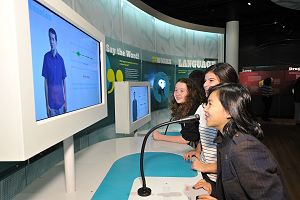We’re winding down the “Smart Summer Challenge” over here. The challenge is all about combating the “summer slide”: the “brain drain” some researchers have found happens during the summer. Does the summer slide really even exist?
I had the opportunity to interview Dr. Rob Desalle, of the American Museum of Natural History’s Division of Invertebrate Zoology, and curator of Brain: The Inside Story, currently on view at the Museum.

—
The media made a mountain out of a molehill when they seized on the Mozart Effect. To what extent is it important that parents and educators understand neurological science? Are there applicable lessons we can draw from the latest research? Or are programs or exercises to boost learning a “wild neuron chase”?
Dr. Rob Desalle: The Mozart Effect is somewhat controversial and to my knowledge is based on an interesting study published in Nature almost two decades ago. Some researchers in subsequent studies could not replicate the original results or showed that the results were explained by other factors. However, I am not surprised that an effect might exist. The things we hear and see and smell etc have an impact on our brains at all times. What is alarming is that we always look for the silver bullet, the easy way out. Giving a CD of Mozart music to each child born in a state is a lot easier than working with teachers to figure out how and why children and youth learn. Its a lot cheaper and a lot more appealing to the general public. But the real way to enhancing education and enhancing the capacity of our children to learn is to do the hard work and understand better why children learn.
Do our brains, like ice cream, turn to mush during the summer? Is the summer “brain drain” real? And if so, how can parents combat it? Or is summer actually beneficial to boosting brain power?
Dr. Rob Desall: :Again there is very little hard research out there on this subject. The best study was done by Johns Hopkins researchers and their colleagues where they showed that children in general “lose” one to two months of learning as a result of summer inactivity. But there are social and cultural factors involved that complicate the picture. For instance, math knowledge seems to be more adversely impacted by the summer. Reading is impacted but only in certain socio-economic groups. The latter observation occurs because students of well to do parents are around more books at home. This latter observation suggests that if you create the right environment for children in the summer then they will avoid the drain. We also have to keep in mind that exercise and physical activity are also beneficial to the brain, especially developing brains. Sports such as tennis, table tennis, and chess are excellent activities that kids can engage in and have a positive impact on their brains.
Are there short-term or long-term ways to boost memory or improve information processing or other brain processing for students?
Dr. Rob Desalle: Like muscles in our body, our brains develop and become more efficient with practice and exercise. To expect a child to maintain a certain level of intellectual development over an intellectually inactive summer is silly. Just like it would be silly to expect a child to increase muscle mass over a physically inactive summer. So the answer to the question is simple. Keep active intellectually; keep your children active over the summer intellectually. Have them read, or add up the grocery costs, or give them math tasks around the house.

Are there ways to help teenagers focus? Or to improve impulse-control?
Dr. Rob Desalle: Impulsive and out of focus teenagers are a fact of life. We have to keep in mind that there is a great deal of variability as to how teenagers deal with focus and impulse control. These range from reasonable teenagers to impossible teenagers (I have an impossible one and a relatively reasonable one in my life) and everything in between. What this means is that there is going to be no single silver bullet that will allow for a “fix”. Several researchers have studied teens for long term. Jay Giedd at NIH has scanned teen brains to see how they develop over the long term and has observed that there are bursts of growth in the teen years. So the teen years are very important for proper brain development. As for a treatment for teen impulse control I guess we are out of luck. More important than controlling their impulses would be to educate them about the things that can be bad for them, like drugs and alcohol, especially since their brains are still developing while they are teens and drugs can be very detrimental to this development. I think we will always be stuck with the teen dilemma and the best way to deal with it is to deal with teens in a reasonable and reasoned manner.
How can we help students shift from vacation dreams into a school year mindset?
Dr. Rob Desalle: The best way to do this is to not let them settle into the summer vacation mindset. While it is important that the summer be used as time off from school, there is good reason to make sure that children maintain a certain level of intellectual activity over the summer, so that the vacation dreams don’t take over.
—
ADMISSION: Admission to the exhibition is $25 for adults, $14.50 for children, and $19 for seniors and students. The exhibit closes August 14, 2011. For tickets, the public should call 212-769-5200 or visit amnh.org.
—
About the Smart Summer Challenge: The Smart Summer Challenge is a way of inspiring parents to keep learning going throughout the vacation. Find out more about the Smart Summer Challenge and grab our free calendar of summer learning ideas, and “like” the Smart Summer Challenge page on Facebook.
While I do think it’s important to let the kids get a reprieve from school for a little while, the summer slide is very real. We enrolled our son in a science camp during the week in-between camp and school, thinking that would be a way to transition from a purely fun mindset back to learning mindset. Fingers crossed!
I think I’m the ONLY parent in my circle of friends that likes year round school…for that reason. I KNOW that my teenager loses what little he learned throughout the previous year. It does take pre-planning and thoughtful adventures to keep them engaged during the summer….thanks for this post. (I needed a reminder…it’s so easy to let them lounge by the pool and bask in front of video games)
This is a really important topic, as well a fantastic post! Although I find it can be difficult to stay on task during the warm, sunny days, we do insight on daily reading, as well as some specifically chosen fun projects and journal/creative writing weekly throughout the summer!
I think everything published made a lot of sense. However, what about this?
what if you added a little information? I am not suggesting your information isn’t solid.,
but what if you added a post title that makes people want more?
I mean Is the Summer Slide a Myth? Talking About
the Brain with Dr. Rob Desalle, Curator at the American Museum of Natural History | Naturally Educational is a little vanilla.
You might look at Yahoo’s front page and see how they write news titles to grab people to open the links.
You might try adding a video or a pic or two to get
readers interested about what you’ve got to say. In my opinion, it might bring your blog
a little livelier.
I pay a quick visit each day some websites and sites
to read content, however this blog offers quality based content.